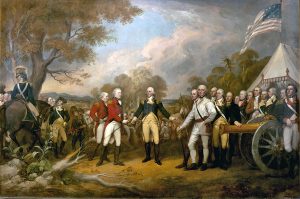Cornelius Vanderbilt led a life of conflict and economic success, and during that life, he earned the nickname “The Commodore.” This nickname had an incredible impact on all who heard it. The child that grew up to become the Commodore was taught to be ruthless and smart when it came to the practice of business. It is undeniable to say that that child grew up to be one of the most influential men in American History, whose legacy will continue on centuries after his passing, whether that legacy was positive or negative. Cornelius Vanderbilt was one of the many men who helped shape American industry. He can be seen as the man who started one of the most economically prosperous periods of American history, the Gilded Age. The story of Vanderbilt and his legacy is long and winding, with shrewd, cunning, and sometimes illegal business deals to be made, and the development of a shipping industry that would rock the east coast and put him on the map. And it all started with a single boat and a small loan.
Cornelius Vanderbilt did not live a life that was common. At the age of eleven, Vanderbilt had to drop out of school and begin working for his father in his shipping business, where he began a new type of education, one that would alter his future and continue to shape an era of American history. This period of his life was crucial and was a pivotal moment for the man he would soon become. The knowledge he obtained while working with his father provided him with a work ethic that catapulted him into becoming a prominent businessman. His father taught him many tools of the trade, that Vanderbilt would not only use often but mastered and became the foundation of his many business practices. He was taught about aggressive marketing and the art of making shrewd deals that would put him above his competitors. But as all birds eventually leave the nest, Vanderbilt aimed for something greater. He began working for himself. He formed his own company by taking a loan from his parents at the young age of sixteen. He bought a ship that he named Swiftsure. In having taken that loan from his parents, he was required to pay them back, resulting in him only receiving half of the profit from his new ferry company.1
Vanderbilt soon shocked the world and quickly rose in popularity as a result of his young age and success. But it was not until the age of eighteen that his empire really took off. He contracted with the United States Government to supply troops with much-needed supplies during the War of 1812. By the end of the war, he had acquired enough funds to purchase a small fleet of boats. Due to his time working with the Government, he was given the nickname “Commodore,” but it was common at the time. His work within the ferry industry led to him starting his shipping empire, which would lead to many business opportunities and business partners. All of this drew the attention of Thomas Gibbons, who was a prominent and well-known businessman, who approached Vanderbilt, asking him if he would captain one of his ships. Vanderbilt then began working for Gibbons and soon became a business manager, all the while continuing to own and operate his own business on the side.2

But not all was going well for Gibbons. Prior to meeting Vanderbilt, Gibbons had been in a long-standing feud against a monopoly that continued while Vanderbilt was working with him. The feud resulted in a legal case that was ultimately resolved in the Supreme Court decision of Gibbons v. Ogden. This case is still viewed as a landmark decision. It proved that Congress had power over interstate commerce and was not subordinate to state laws. This case was brought about due to Gibbons being accused of violating a state-sanctioned monopoly that had been given to Robert Livingston and Robert Fulton. Aaron Ogden sued Gibbons for violating the state statute. Vanderbilt and Gibbons hired Daniel Webster to defend them. Chief Justice John Marshall wrote the majority opinion, stating that New York did not have the authority to regulate interstate navigation, for it was protected under the Commerce Clause of the Constitution.3
Vanderbilt continued onward with his strong work ethic and understanding of business. He began using what he had learned during the time he had worked for his father. While under the guidance of Thomas Gibbons, Vanderbilt began picking up new ruthless tactics. Gibbons taught him how to undercut his competitors to eliminate all competition, as this was a tactic that Gibbons often used. Vanderbilt took these teachings and ran with them. He used these tactics to strengthen his own industry, even after the death of Gibbons. Shortly after the death of Gibbons, Vanderbilt was officially working for himself full time and put a primary focus on expanding his shipping empire. He began to grow, first by taking over Gibbon’s company, and then a ferry owned by his brother. As Vanderbilt began growing faster and faster, he met his competition, and he saw himself facing his first major battle that would make or break his career. This battle was against the Hudson River Steamboat Association. Despite what it may have seemed from an outside perspective, this was no simple battle between two companies. The Hudson River Steamboat Association was a monopoly that controlled the New York area. Vanderbilt was well aware that this conflict would not be an easy victory, and that it would be incredibly difficult to remain on top.4

With this thought, he began doing what he did best. Vanderbilt began relentlessly undercutting the monopoly. He took their business by using the name “The People’s Line,” which gained him a lot of populist support. By undercutting them, he provided better service for a cheaper price, making ferry travel affordable for the common man, which was a belief that the populist platform supported. The Hudson River Steamboat Association knew that if they did not act fast, Vanderbilt would soon take them out of business. They knew the only option they had to was to pay Vanderbilt to leave the area so they could continue their business without such difficult competition. Vanderbilt then proceeded to move to Long Island Sound, where he quickly began growing in notoriety, and his business practice never seemed to slow down. Soon he took over the Staten Island Ferry and continued to show his dominance by controlling the Long Island Sound region. It was during this time, the mid to late 1830s, that Vanderbilt began being commonly referred to as “The Commodore” as a result of his prominent impact as a steamboat entrepreneur.5

Although Vanderbilt had assisted in strengthening the American economy, it was not without its drawbacks. While Vanderbilt was strengthening the economy, he also brought along major hardships. In order to maintain dominance in his industry, he had to manipulate stock prices to be able to buy out other companies, as well as increase the prices of his stock to strengthen his company and prevent it from being bought out. The process by which he did this was with the intent of bettering himself and his company and shady practice at best. He did what is called “cornering the market,” which is a process where you acquire a majority of stock in a business so that you gain control over the company without owning it in its entirety. This process was legal, but simply unfair and manipulative.6 This was one of Vanderbilt’s many cunning and shrewd tactics. He bought a sufficient amount of stock in his competitors’ companies so that he would own a majority of the company. Once he held the majority, he could then influence the price of the stock through actions he took that affected the company, allowing him to decrease the stock price until he could swoop in and buy out the remainder of the company’s stock at highly discounted prices. He would do this with his own companies, but instead of lowering the prices, he would increase them so that his competitors could not do the same to him. This tactic was shrewd but legal, and it was something he practiced often to maintain control of the industry. These practices were characteristic of the men that became known as “Robber Barons.” As his company grew, he began developing partnerships that never lasted long, because his personality was so volatile that these partnerships were doomed to fail from the start. Take, for example, his partnerships with Joseph White and Charles Morgan. The work relationships he developed with his business partners was toxic, and almost always ended in betrayal, as with Joseph White and the Accessory Transit Company. Vanderbilt was a man of great intellect, and he knew how to sway and manipulate people and eliminate the competition. This practice made him many enemies and put people in a position to see him as a threat; he was a man of power, and he would not relinquish that power easily.7
Cornelius Vanderbilt was not the most morally ethical of men; he was shrewd and cunning and he used these attributes to influence his industry, and maintain dominance over it. But these negative aspects did not diminish his contribution to the American economy. His legacy was not simply his wealth, his many business ventures, or the way in which he maintained dominance; his legacy also consists of his contribution towards shaping the United States, bringing it closer to the forefront, and getting a foothold into the world economy. Vanderbilt changed the way businesses operated, which allowed for a rise of a new breed of businessman, the robber baron. This breed of businessman shared similar ideologies to Cornelius Vanderbilt. These men focused on expanding their power and would do anything to keep that power, but they still left a legacy of economic progress. Vanderbilt’s legacy all started with one small sailing boat, that grew into a thriving shipping company that led to an even larger railroad empire. He built his empire from the ground up and strengthened it through ruthless, cunning, and illegal business strategies. He manipulated the markets to help grow his empire and prevent others from staking claims on his business, he also made many enemies and made a name for himself that people either feared, hated, or admired. By the time his life came to an end, he was the second richest man in America, and his wealth would continue to grow long after he had passed, and his legacy the good and the bad can still be seen.
- Arthur T. Vanderbilt, Fortunes Children: the Fall of the House of Vanderbilt (New York: William Morrow, an imprint of HarperCollins Publishers, 2013), 7-9. ↵
- T. J. Stiles, The First Tycoon: the Epic Life of Cornelius Vanderbilt (New York: Alfred A. Knopf, 2011), 9-27, 31-35. ↵
- “Gibbons v. Ogden, 22 U.S. 1 (1824),” Justia Law://supreme.justia.com/cases/federal/us/22/1/) ↵
- T. J. Stiles, The First Tycoon: the Epic Life of Cornelius Vanderbilt (New York: Alfred A. Knopf, 2011), 72, 84-87. ↵
- T. J. Stiles, The First Tycoon: the Epic Life of Cornelius Vanderbilt (New York: Alfred A. Knopf, 2011), 99-104, 124-127. ↵
- “Cornering the Market – Definition, How It Works, Example,” Corporate Finance Institute, https://corporatefinanceinstitute.com/resources/knowledge/strategy/cornering-the-market/). ↵
- T. J. Stiles, The First Tycoon: the Epic Life of Cornelius Vanderbilt (New York: Alfred A. Knopf, 2011), 217-264, 365-386. ↵




60 comments
Alexandra Ballard
I really like how you told Cornelius Vanderbuilts story. The verbiage you used really fit well with the tone of his life. It almost felt like I was reading a story instead of an informative article! It’s so interesting to think how one man could be powerful enough to make such an impact on the American business front in so many ways.
Nnamdi Onwuzurike
Cornelius Vanderbilt seems like a man that would hate communism and I would easily see why. He worked very hard for what he had achieved. Going from a single boat to a massive ferry company and then the railroad is no small feat. This was a very interesting story to read and it explained how the stock market was manipulated.
Victoria Castillo
Hello Aaron! First off, I would like to say that the article is amazing! Secondly, your description of Vanderbilt’s character as being “ruthless” and “cunning” strengthened his title as “Commodore” as it showed he would not back down from a challenge that was presented to him. His use of appealing to the populist people and doing so was also interesting as you would think that people with that much power wouldn’t really care to stick to those type of actions if it did not show benefit to them.
Hunter Stiles
Congratulations of the publishing of your article Aaron! You did a great job on the piece. You captivated me with a strong introduction, what really pulled me in was when you titled him as “one of the most influential men of American history”, and on top of that the post was really instructional and informative. Given that Cornelius V. was so sharp and clever, learning his backstory was very unanticipated. He became who he was as a result of how he was educated. I think that providing that background allows the readers a greater understanding of knowledge! The knowledge and strategies he acquired at that time period are what made him the sophisticated businessman he is reputed to be. Simply said, it demonstrates how chance determines a person’s course. I really enjoyed this article. Keep Writing !
Madison Magaro
This was my first time reading about Cornelius Vanderbilt and how he got the nickname “The Commodore.” It is interesting to read that he dropped out of school at age eleven to go work for his father’s shipping company which ended up teaching him how to have a good work ethic. I also think it is cool how he took out a loan from his parents at the age of sixteen to buy a boat and his company started to take off at the age of eighteen. Overall this was a great article and the author did a great job telling us how Vanderbilt got his nickname.
Isabel Soto
I learned more about vanderbilt than what i already knew about him.one of the main points i learn from this article is that he gained business techniques from Thomas Gibbons. I felt like he made the best decision rather than just learn the tricks and trades from his father. Another fascinating thing is that he started his own business at the age eighteen.i felt like this article is well structure by giving off good informational pieces.
Iris Reyna
Wow! Good job on the article Aaron. The article was very informative and educational and you hooked me with a strong intro. Seeing the back story of “The Commodore” was kind of surprising because he was very young and cunning. The way that he grew up was what made him who he was. All the experience and tactics he gained over that time are what helped him become the ruthless businessman he is known for. It just shows that people are destined for a path. Great emphasis on the tactics that were a bit shady but you did a good job of maintaining enough distance to offer both sides enough key details.
Nathaniel Liveris
Great Article! An interesting look into a cunning and ruthless capitalist, unafraid to get his hand dirty in the murky waters of industrialization and competition. From the way he bought out his competitors, to his rather humble upbringings, Vanderbilt had a life that was both common and extraordinarily wealthy, and is an example of how one man’s fortunes can change within his lifetime.
Marissa Rendon
After reading this I felt like I never knew what was next to come. I lived my life not knowing a single thing about Vanderbilt, what caught my eye the most is how he started his company at age eighteen. Being the same age as he was when he started his company is so crazy to me
D'vaughn Duran
Cornelius Vanderbilt didn’t have a high education like some other fat cats in business. Rather than learning tricks of the trade from his father. With his Father being successful and learning the trick on business he got a loan and wanted to make a name with a splash it seems. He also came at a great time with the war so must have been great timing also that helped him. Also, the shady practice he did with stock to better his company and himself was smart because he manipulated for his benefit. This was a great read and with the set up the article making it very enjoyable to read!